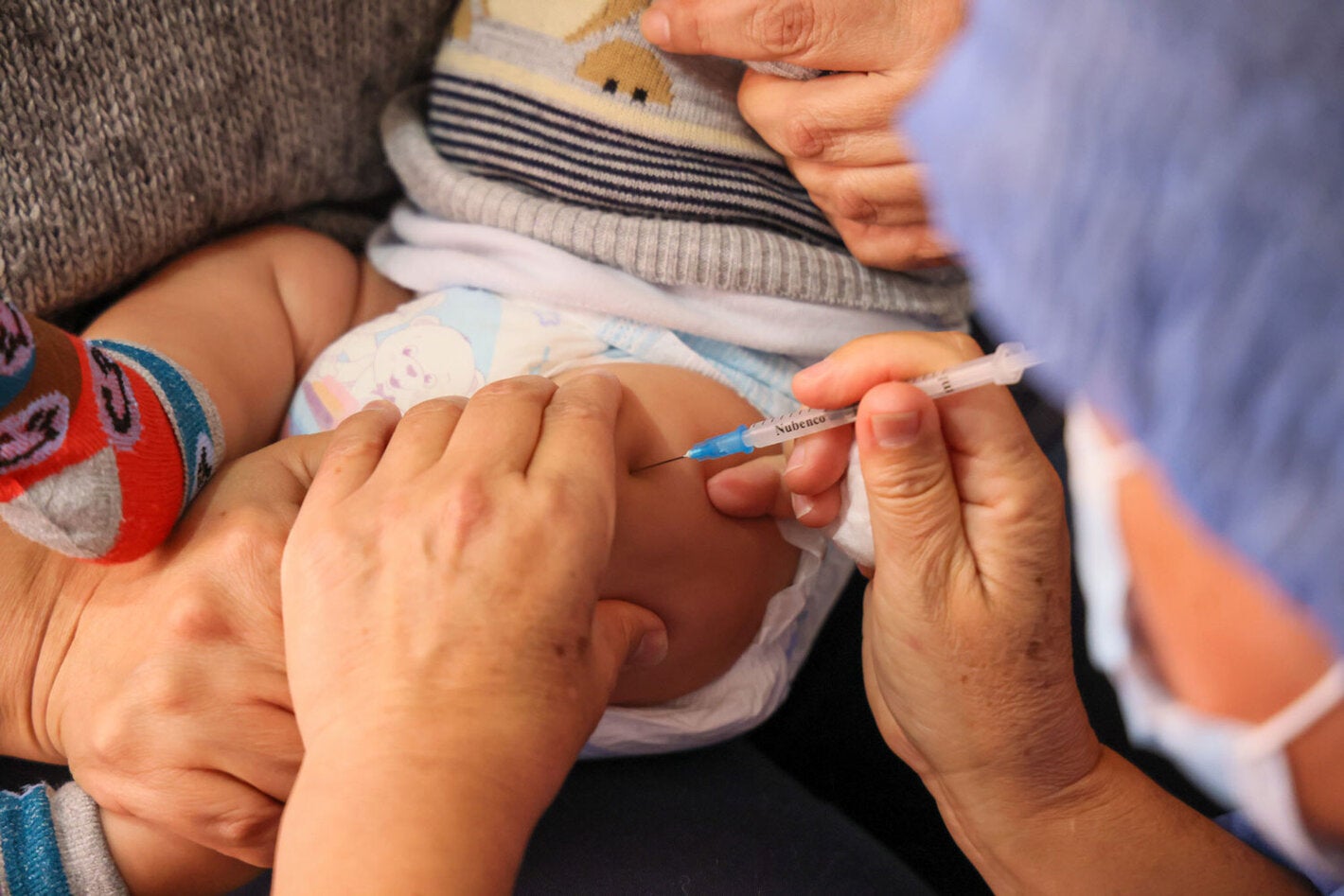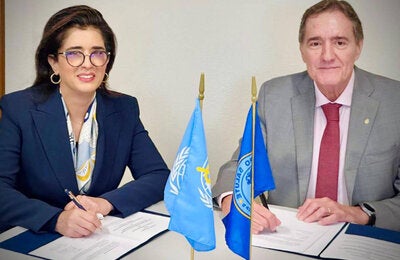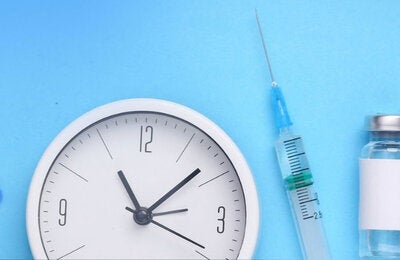
Santiago, Chile, 24 April 2023 (PAHO) - The Pan American Health Organization (PAHO) today officially launched Vaccination Week in the Americas, an initiative that aims to mobilize concerted action across the region to boost routine and targeted immunization efforts.
Taking place from 22 to 29 April, this year’s Vaccination Week in the Americas (VWA) campaign aims to reach more 92 million people with over 144 million doses of different vaccines in 45 countries and territories.
The drive comes as the risk of vaccine-preventable disease outbreaks is at a 30-year high in the Americas, with one in five children under the age of one year not fully protected against multiple vaccine-preventable diseases.
“PAHO is working with countries to revitalize immunization programs and use this key public health tool in all its strength to save the lives and protect the health of people in our region,” PAHO Director Jarbas Barbosa said at the launch of this year’s VWA.
Dr. Barbosa spoke at a panel discussion to officially launch VWA, where he was joined by representatives of government, academia, civil society and youth to discuss challenges, opportunities and strategies to boost immunization rates in the region.
During the event, video messages were also delivered by Ms. Yazmin Colón de Cortizo, First Lady of Panama; Dr. Nísia Trindade Lima, Minister of Health of Brazill; Mr. Jerome Xavier Walcott, Minister of Health and Wellness of Barbados; Rochelle P. Walensky, Director of the US Centers for Disease Control and Prevention and Chris Elias, president of the Global Development Division of the Bill and Melinda Gates Foundation.
While declining vaccination rates have been observed in the region during the past decade, the COVID-19 pandemic exacerbated the problem through the disruption of health services and increased hesitancy brough upon by misinformation, the PAHO Director said.
“Yet COVID-19 also gave us an opportunity, as it enabled strong cooperation between PAHO and countries to develop national immunization plans, train healthcare workers, and strengthen cold chain operations,” he said.
With high level political commitment and the participation of communities and societies, the PAHO Director said he is “confident that the region can regain its leadership position in immunizations, as it had in the past.”
He also called on countries to revamp immunization programs by taking advantage of innovations. This includes the use of geo-referencing tools to gather vaccine data to inform interventions, tools to quickly identify operational gaps, and the use of social and behavioral data and strategies to tackle vaccine hesitancy.
Over the last 20 years, VWA has been the most important initiative for immunization programs in the region to bring doses to populations. The initiative has helped countries reach nearly 1.1 billion people in more than 40 countries and has supported the control of many diseases, along with the elimination of polio, measles, congenital rubella syndrome, neonatal tetanus, hepatitis B and smallpox.
This year, 24 countries are planning to reach more than 55 million people with COVID-19 vaccines, both primary and booster doses. Participating countries and territories are also set to reach over 84 million people with the influenza vaccines, with a specific focus on those most at risk, such as pregnant women, older adults and health workers.
Efforts to keep the Region of the Americas polio-free include the vaccination of almost a million children with polio vaccines during the week. The Americas was declared polio-free in 1994, but dwindling rates have put many countries in the region at high risk of a resurgence of this devastating and untreatable – and vaccine-preventable – disease.
In addition, countries have pledged to administer over 800,000 doses of vaccines against measles and rubella. These efforts will support the regional goal to obtain once again elimination status. Other goals include vaccinating more than 3 million people, including pregnant women and children, against diphtheria, tetanus, and whooping cough.
Quotes high-level speakers:
Ms. Yazmin Colón de Cortizo, First Lady of Panama
Vaccines have been around for centuries and have saved millions of lives. They are undoubtedly one of medicine’s greatest success stories.
Vaccination is also an act of solidarity as vaccines not only protect those who are vaccinated but also contribute to safeguarding the most vulnerable members of the community.
Panama, a reference in the region for its high immunization rates, will continue to work to ensure equitable distribution of vaccines, especially to underprivileged populations.
Dr. Nísia Trindade Lima, Minister of Health of Brazil
In 2015 we had 90% vaccination coverage for some diseases – such as measles and polio - which are major threats to the health of the Americas. Today we have coverage of 70%.
Recovering immunization in Brazil is a priority for the Ministry of Health, as well as for the region and the world. So long as one country remains unprotected, no country is protected against vaccine-preventable diseases.
Dr. Jerome Xavier Walcott, Minister of Health and Wellness of Barbados
In our own region of the Caribbean, more than 11000 children younger than one year – almost 1 in 10 – did not receive all the vaccine doses in 2021, leaving them susceptible to disease such as polio, tetanus, measles and diphtheria. Diseases we had already eliminated from our shores.
But there are notable achievements, which must be recognized. In the non-Latin Caribbean, more than 3 million people have been fully vaccinated against covid-19 over the last 2 years. In my own country, more than 55% of population has received at least 2 doses of vaccine.
When we come together, even during difficult times, we can achieve great things. My administration is committed to investing in all components of the national immunization program to ensure that persons of all ages have access to this essential service.
Rochelle P. Walensky, Director of the US Centers for Disease Control and Prevention
Efficient, effective and equitable immunization programs are our first line of defense against outbreaks, and today we have much to celebrate. We celebrate that, at regional level, by the end of 2022 over 2 billion COVID-19 vaccine doses have been administered in the Americas, and almost 71% of population of Latin America and the Caribbean had received at least 2 doses of the vaccine.
Even with these successes, vaccination services in the Americas – as in other regions in the world – are facing an impending crisis.
Addressing the alarming decline in immunizations will take action at every level. It will take all of us partnering together to strengthen this collective effort.
Chris Elias, president of the Global Development Division of the Bill and Melinda Gates Foundation
Countries in the PAHO region have long been global leaders in immunization. Since the region launched its expanded program in immunization in the 1970s, countries have introduced more than 16 vaccines into their national vaccination schedules.
These life-saving vaccines have protected generations of children, giving families and entire communities the opportunity to lead healthy and productive lives.
In 1994 the Americas became the first region to eradicate the wild polio virus, a major feat that provided the blueprint for polio eradication efforts around the world.
We know that 2023 is a critical year to eradicate polio for good. We must recover polio immunization rates across the PAHO region to prevent new cases.



